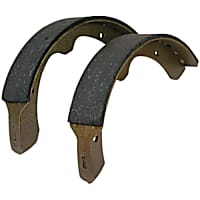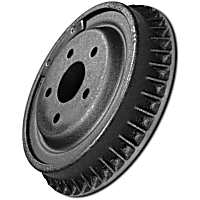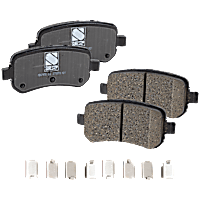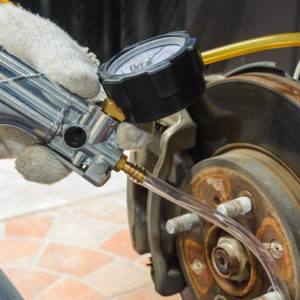Nothing—except, perhaps, 90s boy band music—sounds worse than squeaky brakes. Every time you press the brake pedal, the unnerving sound fills your ears. Besides turning up the radio, and masking a potentially dangerous problem, what can you do to get rid of the noise? And what exactly do squeaky brakes mean, anyhow?
What Do Squeaky Brakes Mean?
We’ll give you the good news first: Squeaky brakes don’t necessarily mean your pads need to be replaced. You see, there are two distinct brake noises—one being a metal-on-metal grinding and the other being an annoying squeaking. Either of these can be a symptom of bad brake pads, but the grinding is more worrisome than the squeaking—although it can be hard to distinguish between the two.
Whether you’re hearing a grinding or a squeaking, no brake noise should be taken lightly.
Note: The following information is for educational and entertainment purposes only. To ensure your vehicle is safe, have it inspected firsthand by a professional.
Squeaky Brakes vs. Grinding Brakes
A metallic grinding or scraping noise is bad news. Usually, the sound indicates your pads are worn to the point that either the wear indicator or backing plate is digging into the brake rotor. Also, if your car has rear drum brakes, a grinding sound can mean the brake shoe backing plate is contacting the brake drum.
In some cases, you may only hear the grinding or scraping when coming to a stop. On the other hand, if the wear indicator is contacting the rotor, you’ll likely hear the noise anytime the vehicle is in motion.
And how about a squeaking or squealing noise? Well, that can indicate a number of issues, as we’ll discuss below.
Why Do My Brakes Squeak When Stopping?
Every time you come to a stop, you hear an obnoxious squeaking noise. What could it be? In a disc brake system, some of the most common causes include:
Glazed or contaminated friction material
One possibility is that the pad’s friction material is contaminated with debris or foreign material. Also, the pads could be glazed from getting hot during hard braking. Brakes can also overheat and become glazed on vehicles that tow heavy loads.
Worn or damaged hardware

Squeaking brakes can result from vibrations. The root cause could be damaged or loose brake hardware, such as springs, built-in shims, and anti-rattle clips.
Moisture accumulation
After your vehicle has been sitting for a while, you may hear a squealing sound the first few times you apply the brakes. Over time, moisture accumulates on the brake rotor, creating rust, and it takes a few stops for the pads to clear the buildup from the rotor. In most cases, the noise is normal and is nothing to worry about.
Lack of lubrication to the backing plate
If there isn’t enough lubricant between the brake pad backing plate and the brake caliper, the brakes may make a squeaking noise.
Pad friction material
Finally, the noise may be due to the pads themselves. Semi-metallic brake pads are particularly prone to squeaking, as we’ll discuss later on.
But wait—what if your car has rear drum brakes? Much like disc brakes, drums can cause squeaking due to glazed or contaminated friction material, as well as lack of lubrication to the backing plates. Worn or damaged hardware, or the formula of the shoe’s friction material, can also cause a squeaking noise.
Why are My New Brakes Squeaking?

There are three primary types of brake pads: organic, ceramic, and semi-metallic. Metallic brake pads are known for their exceptional stopping ability. Unfortunately, they’re also known for being noisy—sometimes, right out of the box.
So, if your brand-new brake pads are squealing, it may be due to the composition of the pads themselves. In such a scenario, you can either learn to live with the noise, or upgrade to quieter ceramic pads.
There are a couple of other reasons why your new pads might be making noise. Neglecting to lubricate the pad backing plates can lead to squeaking. Also, forgetting to reinstall hardware, such as anti-rattle clips and shims, can cause noise.
How to Fix Squeaky Brakes

In many cases, it can be difficult to distinguish between grinding brakes and squeaking brakes. As such, if you’ve got any noise whatsoever, you should check your brakes (or get them checked by a professional) right away. You could have a potentially dangerous problem on your hands.
If, however, you find the pads and rotors are in good condition, with plenty of material left, you can try a few tricks to quiet them down.
Lubricate the backing plate contact points
You can apply special brake lubricant to the points where the pad’s backing plate contacts the caliper. It’s also a good idea to lubricate the caliper sliders (if equipped).
Caution: Never apply lubricant to the friction surface of a brake pad or shoe. Doing so will result in reduced braking ability
Replace the brake hardware
Usually, brake hardware is pretty inexpensive. As such, you may want to try throwing on a hardware kit to address noise issues.
Swap out the pads
If that doesn’t work, it may be time to replace the brake pads themselves. It’s also a good idea to resurface (if possible) or replace the rotors at the same time.
To determine whether a rotor can be reused, it must be inspected for several different qualities, including minimum thickness. All rotors have a minimum allowable thickness after resurfacing listed in the factory repair information. If resurfacing would take the measurement beyond that limit, the rotor must be replaced.
What if you’ve got squeaky drum brakes? First, check the brakes for damage and wear. If everything looks okay in that regard, you may want to try cleaning the brakes with an aerosol cleaner—especially if there’s a lot of dust buildup. You can also try applying brake lubricant at the points where the back of the brake shoe contacts with the backing plate (once again, never apply lubricant to the shoe’s friction material). If that doesn’t work, you may need to replace the brake hardware and adjust the brakes.
Finally, if all else fails, it may be time to replace the brake shoes themselves. It’s also a good idea to resurface (if possible) or replace the drums at the same time.
What are you waiting for?
Now, you have no excuse to live with squeaky brakes—the automotive equivalent of fingernails on a chalkboard. Get your brakes fixed to ensure your car is both safe and quiet.
Products Mentioned in this Guide
Any information provided on this Website is for informational purposes only and is not intended to replace consultation with a professional mechanic. The accuracy and timeliness of the information may change from the time of publication.

 Brake Shoe Set
Brake Shoe Set
 Brake Drum
Brake Drum
 Brake Pad Set
Brake Pad Set


























One more troubleshooting tip: Following a DIY installation of (after market) front pads and rotors, my 2009 Honda Accord was screaming for attention. Both when braking as well as taking off following a stop. It turned out that the new metal clips were slightly out of tolerance. This required grinding them such that the edges of the clips no longer contacted the rotors. Issue resolved.
I just installed the powerstop z23 complete brake kit on my 2004 cadillac xlr. I followed the directions and break in period to the tee. They sqeak!! Alot of brake dust in break in period I noticed…